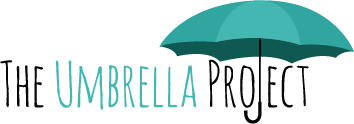
Umbrellas Are Not Just For Kids!
These days, a lot of what I hear from my clients and my friends is the incredible pressure on parents who are trying to work full-time from home with young children to look after or to help with their education – whatever form that takes. I have yet to meet one person (with or without children) who is not struggling to cope on some level as a result of the current COVID pandemic. Some of us are still optimistic or have practiced a lot of gratitude in the past which is certainly coming in handy now. Some of us may be privileged enough that this feels more like a giant inconvenience than a serious life threat. Some of us may be facing real obstacles to getting even our most basic needs met. And some of us may have to dig deep to get through each week, each day, or even each moment.
The internet is overloaded with resources and tools and activities for parents looking for ways to occupy, entertain, educate, and support the mental health of their children at this time. It is true we can find tons of opportunities to strengthen our child’s umbrella right now, but let’s take a step back and look at the bigger picture, the one that they see.
What does your umbrella look like these days? Even more importantly, how are you engaging with it? Do you even remember you have one? Are your kids watching you stand out in the rain, getting drenched? How do we support mental and emotional well-being in others when we can barely stay sane ourselves?
It is time to shift the focus. Children learn through modeling and The Umbrella Project works through seeing and hearing examples of people exercising or growing their umbrella skills.
Stuck at home together with your kids, like it or not, you are their biggest model right now.
If you want to support your child’s mental health, support your own first.
It’s like the oxygen mask on an airplane: “always secure your own mask before assisting another person”. You cannot shelter someone from the rain if you do not have, or are not using, your own umbrella, nor can you model skills you cannot yet identify.
Do your own Umbrella Assessment. Identify your strengths and opportunities. We all have both! Explore them. Talk about them. Own them.
The Umbrella Skill I find myself emphasizing the most right now when I speak to parents is self-compassion. Honouring the struggle while acknowledging you are truly doing your best, is an incredibly valuable practice that will help you find peace during the uncertainty of these times, that you can then share with your children.
Furthermore, consider your specific situation and decide if now is truly a time to strengthen your umbrella, or if perhaps this is a moment of deluge during which you are better off seeking shelter under the parts of your umbrella that are already familiar and strong. There is no “right” approach to getting through this.
This is a challenging time for people of all ages. Remember you have an umbrella too, and regardless of what it looks like, it is how you engage with it that matters. When you can see that for yourself, your children will see it too.
Until her clinic space in Toronto can reopen safely, Laurie is currently offering private telemedicine consults and online group workshops on the topics of stress, anxiety, burnout, and recovery towards joyful living. As a parent who has suffered from, and recovered from burnout, Laurie has found immense benefit from engaging with her own umbrella. She uses the principles with people of all ages in her practice where she provides compassionate and holistic naturopathic care for children and their families. For direct inquiries please visit landmedicine.ca or email laurie@landmedicine.ca.

